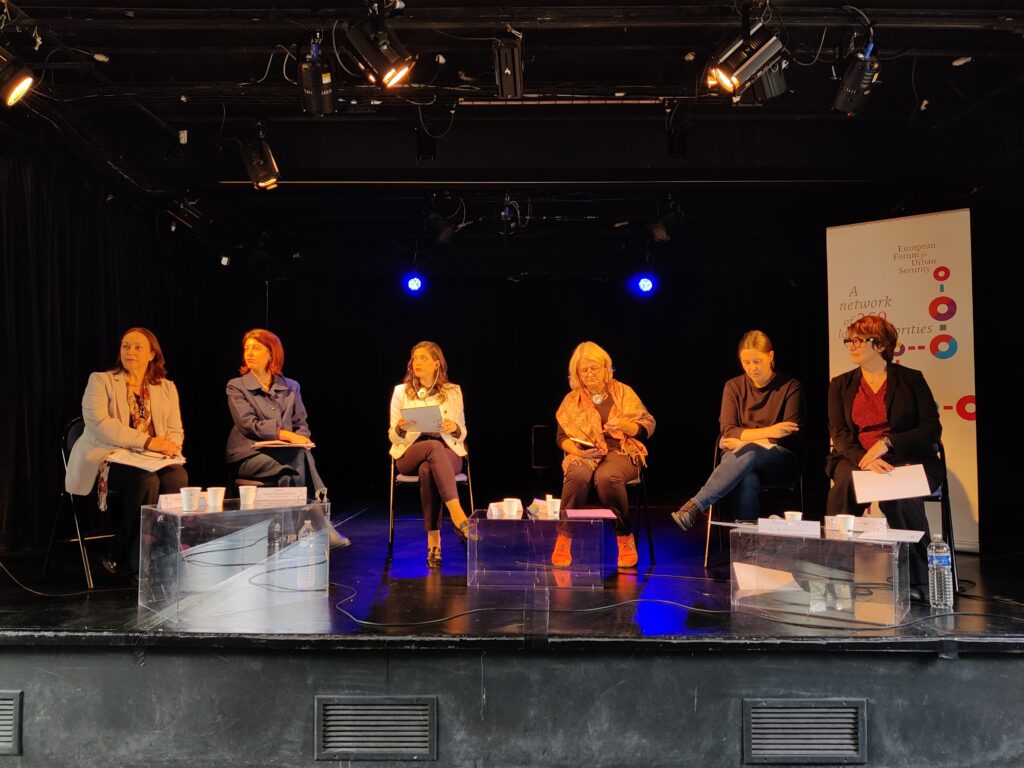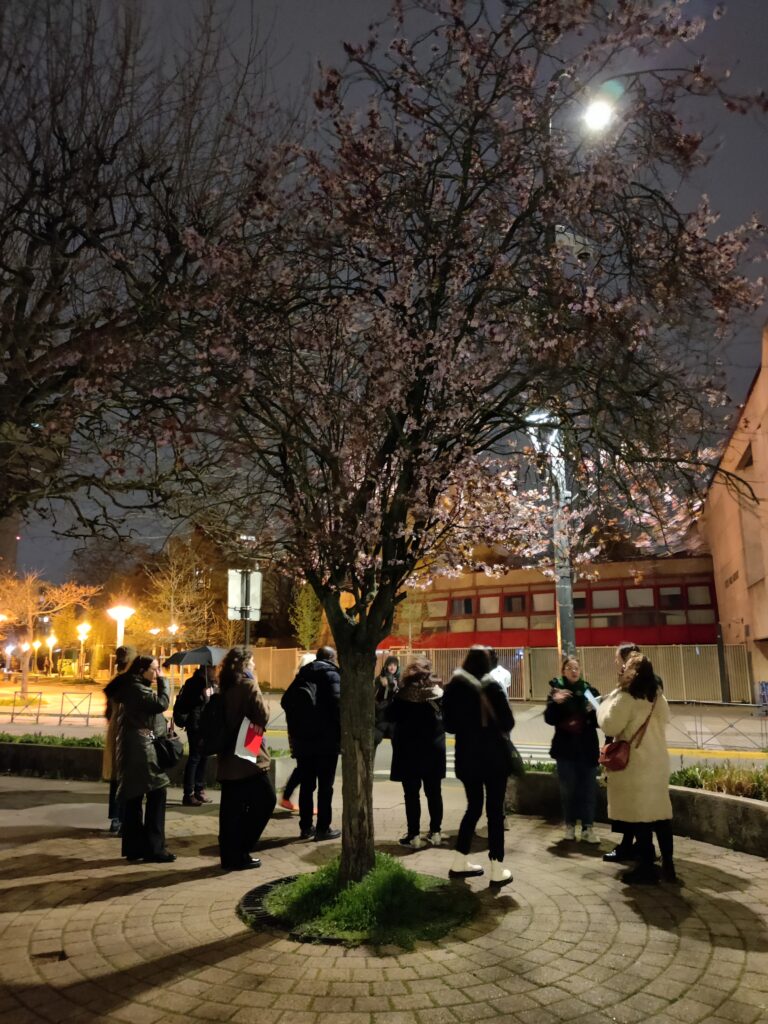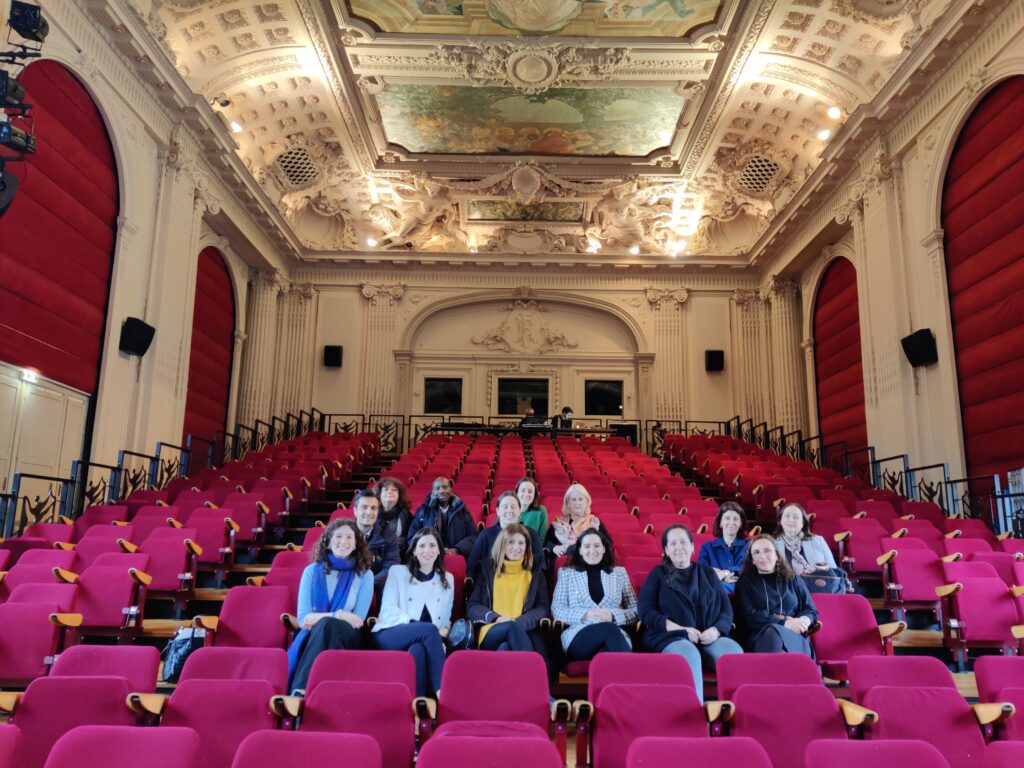Les Lilas, 23 March 2023 – How can we promote a gender-based approach to urban security policies? How can a gendered perspective be incorporated into the assessment and response to the feeling of insecurity in cities? Why is integrating a gender approach into spatial design key in allowing citizens to feel safe and secure? This is what Efus and its Women in Cities Initiative (WICI) discussed with its partners from the City of Piraeus, Panteion University (Greece), and the City of Les Lilas (France) by sharing their experiences during a panel discussion and exploratory walk in the City of Les Lilas, with a focus on safety in cities from a gender-based perspective.
This event was a unique occasion to share the experiences of the City of Piraeus with Efus’ WICI’s expertise on including questions of gender in security policies, and the measures and mechanisms put in place by the City of Les Lilas, a city particularly reducing gender-related inequalities.

The event gathered representatives of Efus, the Municipality of Piraeus (Greece), Panteion University researchers and experts, and elected officials of the City of Les Lilas, with a roundtable moderated by Dr. Barbara Holtmann, Associate Expert of WICI/Efus and Director and Founder of Fixed Africa, a South African-based organisation with a strong focus on women’s equity and safety.
Efus, the City of Piraeus and Panteion University (Greece) worked together within an EU-funded project, BeSecure-FeelSecure (BSFS), which aimed at creating a local council for crime prevention and a risk assessment system to help collect and analyse crime-related data in the City of Piraeus, coupled with social interventions and spatial design measures to improve the level of security in the city.
Creating safe and inclusive cities for women will create safe and inclusive cities for everyone
Gender-based violence is not just a women’s issue; it is a symptom of systemic inequality and discrimination that exists in our societies. This requires a shift in mindset, policies, and practices, and a commitment to addressing systemic inequalities.
“Gender-based violence is just one symptom of inequality. It’s time we tested the hypothesis that if a city is safe for women, it’s safe for anyone. If we want to have a safe society, we need to ensure that all the voices of the society are heard.”
Barbara Holtmann – Associate Expert of WICI/Efus and Founder and Director of Fixed Africa, specialist of community and government processes, visioning, rapid assessment and measuring social impact.
To effectively address gender-based violence, a holistic approach is needed that takes into account the experiences and needs of all members of society, including marginalised groups such as women and girls. The participation of all voices in society ensures that marginalised groups have equal access to decision-making processes. This includes being involved in shaping the design and development of public spaces.
In fact, public space is rarely designed with gender in mind. However, “women are often more knowledgeable about a city than men are: they know what the safe routes are, they know the best sanitation spaces and they often find strategies to work around potentially dangerous areas,” as remarked by Dr. Barbara Holtmann.
Creating safe and secure cities requires inclusive spatial and environmental design
Which areas feel safe and unsafe? What are the effects of inclusive spatial design?

The event was an occasion to walk the streets of Les Lilas from a woman’s perspective, with the aim to gain insights into the experiences and challenges that women face while navigating their urban environment.
As public space is rarely designed with women and minority genders in mind, mapping a route through this lens is essential when discussing safety and unsafety.
Dr. Holtmann explained that if a route is deemed unsafe by somebody (usually a woman), they are likely to avoid it in the future. This may result in missed opportunities, limited access to services and ultimately, a space which is not occupied in the intended way.
Therefore, it is vital that municipalities adopt a gender-based approach for all issues of urban security.
Exploratory walks are also excellent tools for writing guidebooks and mapping out areas of a city which need more attention. This can help to promote a more inclusive and welcoming environment for all members of the community.
How can cities integrate a gender-based approach into their public policies?
Integrating a gender-based approach in security policies and planning of urban spaces is crucial to ensure safety in cities. Women are more vulnerable, especially when accompanied by children, meaning their perspectives must be more purposefully used when addressing urban insecurity.
The cities of Piraeus and Les Lilas prioritise these perspectives in the design of their security policies with various assessment and support methodologies and awareness-raising initiatives.
For instance, the City of Piraeus, Greece’s largest industrial port city, faces low social cohesion and a high fear of crime. The partners of the BSFS project valued the consideration of diverse voices alongside their model of “Crime Prevention through Environmental Design” and included a participative, holistic approach in the form of a series of interventions and practices, working closely with non-governmental organisations, criminology experts, and researchers from Panteion University.
To better consider marginalised groups, particularly women and children, the City of Piraeus introduced practices such as the baseline assessment method to understand how different sectors of the population perceive security, and the Collaborative Urban Risk Management (CURiM) platform to detect physical and cyber threats and assess the associated risks. Moreover, the City created a Victim Information Unit to provide psychosocial support and legal advice to victims, and foster social and spatial interventions. By prioritising the voices of marginalised groups, the City of Piraeus hopes to create more equitable and effective urban security strategies that benefit all residents, thus addressing issues and developing a safer and more inclusive community.
Investing in prevention
In the City of Les Lilas, addressing the issue of gender equality starts at a young age. The city has initiated several campaigns in schools which promote gender equality and combat gender stereotyping. They believe that addressing these issues at a young age can help create a more equal society in the future. Likewise, the City of Piraeus conducts student training sessions on bullying and cyber-threats.
Urban security investment is generally channelled towards surveillance and physical security measures like CCTV, rather than preventative and sustainable initiatives like social projects that offer support to vulnerable genders.
“Preventative measures are far more effective because they have long-term benefits, both for individuals and for society as a whole. By addressing the underlying causes of violence, we can create safer and more resilient communities that are better equipped to respond to future challenges.”
Lisa Yahiaoui, Deputy City Councillor, City of Les Lilas
The City de Lilas, a hub of inspiring initiatives to promote gender equality
Another important campaign carried out by the City of Les Lilas is the renaming of sports parks and public buildings with the names of notable women. This highlights the contributions of women throughout history and combats society’s tendency to overlook their achievements. Additionally, the city has launched a poster campaign around the city to raise awareness about sexual harassment and promote discussions about these issues.
A further initiative was an exhibition in the town’s theatre that showcased the views of young people on topics such as gender equality, mansplaining, masculinity, and feeling safe in their city. This exhibition was designed to give young people a voice and to raise awareness of the issues they face.
Have you heard about Le Kiosque, the information centre for young people of the City of Les Lilas?
All these projects were implemented following the Feminist Film Festival (Festival du film féministe Gisèle Halimi) in October 2021, which aimed to promote and celebrate the contributions of women in the film industry. The festival was another opportunity for the city to raise awareness about gender equality and to encourage discussions about these issues.
For more information consult Efus’ Women in Cities Initiative, BeSecure-FeelSecure and the City of Les Lilas.





